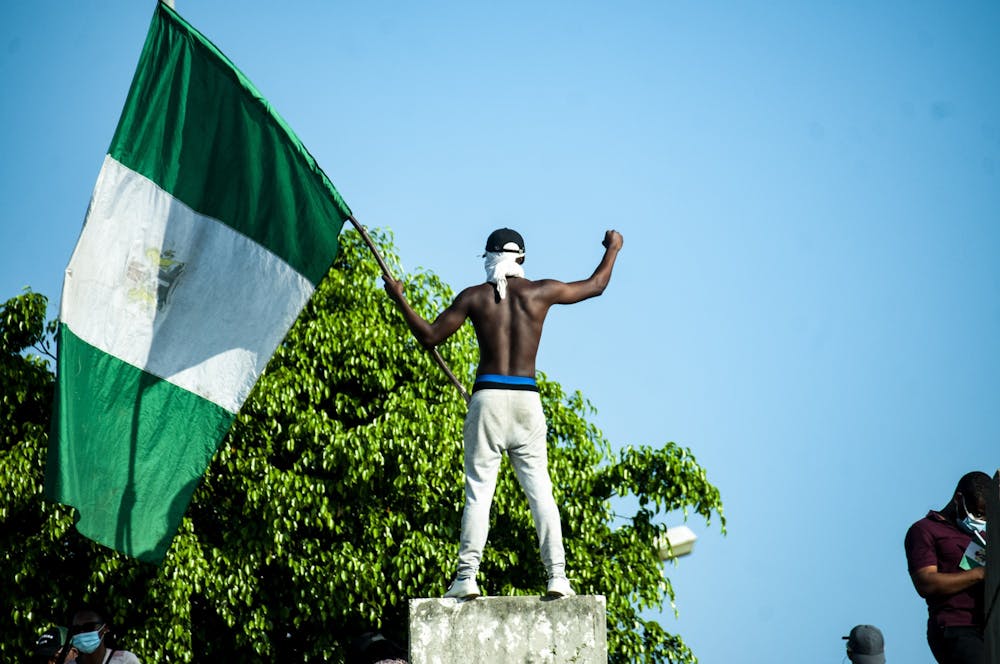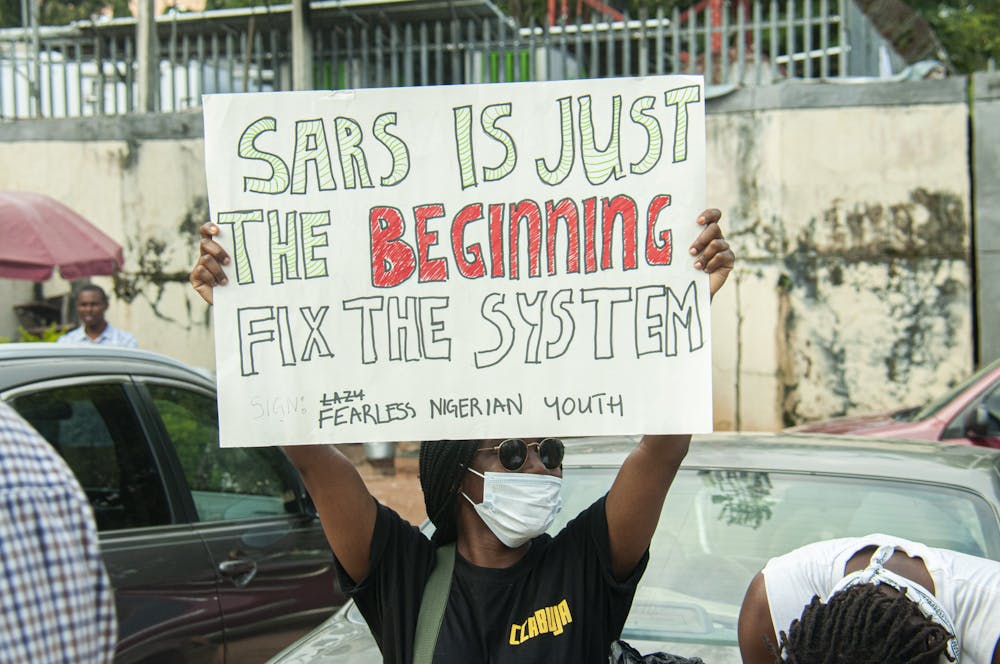As a young person, there is no better time to stand up against oppression than today. Here at Princeton, we demanded that racist legacy be condemned, and demonstrated that we will never settle for mediocre resolutions. We were successful in renaming Wilson College and positively redefining our narrative. First College —to be renamed for Mellody Hobson ’91 — is our legacy, and history will remember.
Just as Princetonians stood up to rewrite history, youth in Nigeria have also taken to the streets to peacefully protest against injustice in their local communities. Take, for example, the #EndSARS movement, and see how young people like us are pushing for change in Nigeria. We the authors, as young Nigerians, must ensure that history remembers the brave Nigerian youth who marched peacefully as one against an estranged police unit sanctioned by an oppressive government. If you, like us, are tired of the injustice around you, draw inspiration from these Nigerian youth who are writing and rewriting the history of their great nation.
This article deals with the #EndSARS movement in Nigeria and the importance of being brave, even in the face of oppression. Before we continue, a clear distinction needs to be made: this article is not calling for foreign help to solve Nigeria’s problem, nor is it begging for empathy from “the world’s greatest minds.” Instead, this is about how young people can be brave in the face of adversity. It is about the hope that prevails in these minds, and the inevitable victory that ensues.
To fully grasp the significance of the current #EndSARS protests, it is important to understand the history that has led up to this moment. Nigeria’s Special Anti-Robbery Squad (SARS) was founded in 1992. Initially, its main goal was to detain, investigate, and prosecute people involved in violent crimes like armed robbery and kidnapping. Over time, however, SARS evolved into a rogue group, completely forgetting its place as a unit of protection for the good citizens of Nigeria. The squad moved from arresting street criminals to shaking down the innocent youth. For many years, the Nigerian youth have been criminalized by the police. Many have suffered and been killed extrajudicially for standing up for themselves. To worsen the situation, several elite personalities consistently opt-in for private bodyguard services, further normalizing their presence in Nigeria.
Due to this reality, there have been ongoing calls for the police force to be reformed since Nigeria returned to democracy in 1999; every government since then has promised to enact police reform. The government has previously announced that SARS would be disbanded, so it is either that SARS is actively disobeying orders from the government or that the government is saying one thing to the public and giving contrasting orders to SARS units.
Consequently, the Nigerian youth decided that they had had enough. The #EndSARS hashtag began trending on Oct. 4, and for two weeks, young people took to the streets peacefully. Their objective was clear: to protest unlawful killing by SARS units. With posters in hand, they organized through social media as a cohesive unit. An extremely diverse group, they marched as one, in peaceful protest against the government. In response, SARS units, as well as other police, and even the army, opened fire on several citizens, killing numerous people and injuring others. The world watched, but it remained quiet. Nevertheless, the youth stood their ground, dusted themselves off, picked up their posters, and resumed on their course — fearless, even in the face of oppression.

Opara God’s-Promise Chukwudiebube for The Daily Princetonian
It is with this courage in mind that we write to the Princeton community, that we may draw inspiration from Nigerian youth, and constantly fight for what we believe in, regardless of the stakes. As we have done before, we must continue to uproot traces of injustice within both our local Princeton community and the international communities that constitute our student body, faculty, and greater Princeton society.

The question remains: what can we do? What can we truly do to tackle these injustices? First, we must begin the work of creating a community that has sincere concern for all humanity. Even at Princeton, we must interrogate why academic investment in African Studies remains extremely limited. Princeton does not have an African Studies department, and it only offers four African language classes (Yoruba, Swahili, Twi, and Wolof) out of thousands of languages on the continent. With no African Studies department, and only about 3 percent of our population being African students or faculty, how can we say that we are pushing the boundaries of holistic and cross-cultural learning? Until we are confident that Princeton adequately recognizes and substantially acknowledges Africa as a region worth studying, Princeton’s African students, both international and within the diaspora, will continue to feel undermined and underrepresented.
Additionally, creating a more empathetic community means students must continually fight for one another. We shall never genuinely be in the service of humanity until we act unselfishly on our concern for one another. Undoubtedly, the connections you have formed at Princeton will endure for a lifetime. Beyond the ‘hi’s and ‘hello’s, truly invest yourself into your friends’ lives and their homes. For us, just as Nigeria is a big part of our identities, so also are Princeton friends, professors, and colleagues. Be there for your friends, and care about their homes too. Check in on them regularly, hop on Zoom, or send a check-in text. Show solidarity, not only with those things that concern you, but also with the things that concern them.
As we reflect on the changes we want to see come to Princeton, we close this reflection with a message to the youth of Nigeria who must continually inspire us to fight against injustice. To every Nigerian: Nigeria is our home. We must protect and defend it at all costs. Yes, we are young. Yes, we are untested. But in the same way, we are thoughtful, we are committed, and we will not back down. All roads lead home.
“Never doubt that a small group of thoughtful, committed citizens can change the world. Indeed it is the only thing that ever has.”

— Margaret Mead
Tomisin Fasawe is a senior from Nigeria and can be reached at ofasawe@princeton.edu. Nosakhare Eghe-Abe is a student at University of Ibadan in Nigeria and can be reached at nosaabe99@gmail.com.








